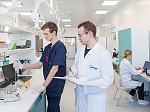In search of a molecule: BSMU scientists work to create a new antidepressant
Modern equipment, the use of advanced technologies and the involvement of young specialists make it possible to implement research on the frontiers of world science. The work of scientists from the Bashkir State Medical University of the Ministry of Health of Russia demonstrates how fundamental research can lead to the creation of innovative drugs.
Scientists of the laboratory for the search for small targeted molecules of BSMU of the Ministry of Health of Russia are conducting a study on the development of drug-candidate for the treatment of depressive disorders. Research aims not only to improve the effectiveness of therapy, but also to reduce side effects, and this makes treatment more accessible and safe for patients.
More recently, laboratory scientists have synthesized a new molecule containing a thiethane cycle, which will become the basis for creating a new antidepressant.
In recent years, scientists involved in the creation of effective antidepressants have increasingly begun to pay attention to the possibility of creating thiethane-containing drugs. At the moment, not a single medicine is registered, which contains thietanes. Thiethane derivatives exhibit various types of biological activity and are low toxic, therefore, they can serve as the basis for the creation of new "first in class" drugs.
Depressive disorders are socially significant diseases, occupy leading positions in the structure of the main causes of disability and suicides and cause enormous economic damage to society, therefore, the issues of their therapy are a priority task of health care. Existing antidepressants are not effective enough (more than a third of patients do not respond to therapy) and have serious side effects; none of the antidepressant classes have clear efficacy advantages over the others, which dictates the need to approach antidepressant choice in a personalized manner based on the features of its pharmacodynamic spectrum and mechanism of action.
The project of scientists of the Bashkir State Medical University of the Ministry of Health of Russia is aimed at developing a domestic drug "next-in-class", superior to well-known antidepressants in terms of effectiveness and safety, which will help expand the arsenal of products for effective personalized therapy of depressive disorders.
World scientific research has proven that even mice are susceptible to this mental disorder. Moreover, depression develops very quickly in these animal organisms. In the course of scientific work, the researchers also learned that mice are affected by the same antidepressants as humans.
That is why rodents are ideal for testing new substances. Employees of the laboratory for the search for small targeted molecules of the Bashkir State Medical University of the Ministry of Health of Russia introduce a special component to the test subjects in order to assess how the behavior of animals will change.
"If antidepressants are introduced to animals, then their despair behavior is significantly reduced and we can compare how animals behave differently," said Gulnara Gaysina, a researcher at the laboratory for the search for small targeted molecules.
“We now have the ability to do molecular docking. We calculate how the molecules will interact with the targets, and only after that we move on to animal experiments. This significantly speeds up the research process,” explains Galina Rozit, the head of the laboratory for the search for small targeted molecules.
The scientific ideas underlying the laboratory's research originate in the work of Ferkat Khaliullin, Doctor of Pharmaceutical Sciences, Professor of the Bashkir State Medical University of the Ministry of Health of Russia.
"The presence of scientific laboratories at the university, equipped with a modern instrument base, allows us to attract our talented students and graduates to research, transferring knowledge and experience that have accumulated at the university for a long time," said Ferkat Khaliullin.
The search for molecules to create new drugs has been going on at the University for over 30 years. During this time, scientists developing the ideas of Professor Ferkat Khaliullin developed:
· “Angipur”, which is at the III stage of clinical trials;
· “Detoxen” is undergoing the first stage of clinical trials;
· predecessor of the radiopharmaceutical in the process of implementation.
To date, scientists have received more than 20 patents for active molecules. The daily work of the laboratory is a combination and addition of new compounds to the material available in the arsenal of scientists.
The path to creating a drug is not fast - it can take 10 to 15 years to find a suitable molecule. It is not enough to find a biologically active molecule, it is important that it becomes a drug.
“After screening, we screen molecules for antidepressant activity. We have the opportunity to conduct such research right at the university, where there are special labyrinths for animals. To do this, we inject laboratory mice with the test compounds, and then compare the results with control groups receiving existing antidepressants. And we observe how our compounds demonstrate higher efficiency,” the head of the laboratory for the search for small targeted molecules Galina Rosit says.
* The laboratory for the search for small targeted molecules of the Bashkir State Medical University of the Ministry of Health of Russia in the intercollegiate student campus is engaged in the synthesis of biologically active substances, radiopharmaceuticals, directly standardization of these substances and conducts pharmacological tests on the cardiovascular system and the central nervous system. The goal is to carry out research and innovation work in priority areas of pharmaceutical science with subsequent transfer to the site for clinical or preclinical studies.


